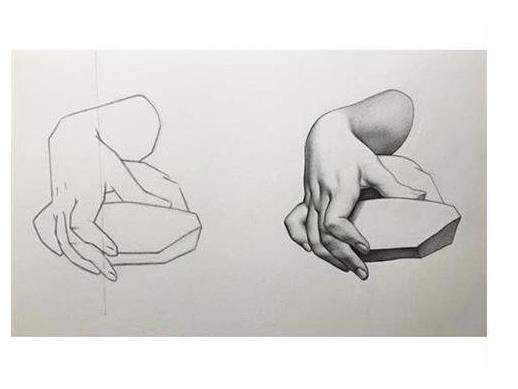Image: #2 bargue drawing, September 2017. Image © Artist Tom Readett.
If you have recently graduated or are planning on graduating in the near future, you are more than likely thinking about transitioning into your dream career. However, according to recent research commissioned by Apprenticeship Support Australia, what was once an exciting time for graduates has become stressful and overwhelming.
The Skillsroad 2017 Youth Census surveyed 13, 227 young Australians aged between 15 and 24 in an effort to better understand young people’s hopes and fears, and explore attitudes and concerns around career pathways and workplace expectations. Almost a third of respondents (31.3%) said financial insecurity was their biggest concern, followed by a lack of jobs after university (23.3%) and then balancing work and study (19.9%).
‘The fact that young people are ranking pay as the most important consideration when applying for a job shows that young people are likely to prioritise money over career paths that they’re genuinely passionate about,’ said James Moran, General Manager, Apprenticeship Support Australia (ASA).
Read: Free tools for students who want work in the arts
Moran told ArtsHub that collectively, the community can help combat these issues. ‘Helping young people utilise the tools to identify their personal goals and interests [will] help them pursue careers that will increase happiness and success, deceasing false starts and negative workplace experiences,’ he said.
Transitioning from study to a career doesn’t have to be a time of stress and concern. Here are some tips to help ensure the process is one of self exploration rather than insecurity.
Don’t panic – get busy
Tom Readett is a visual artist and a graduate of the Bachelor of Visual Arts at Adelaide Central School of Art. After a strenuous final year of study, where Readett faced a time of personal grief, he contemplated giving up on his studies altogether.
‘The final year of my degree I felt really close to giving up – but I didn’t give up, I reminded myself of the mission I had set out on originally which was to secure a career in the arts,’ he said.
‘While I did this I started a Masters of Education at Flinders University and also started volunteering at the Art Gallery of SA,’ he said. Now Readett is at the Gallery full-time as the Tarnanthi, Education Officer.
Though not all young people can afford to volunteer their time, Readett encouraged young people to get involved in their local art community as much as possible.
‘I volunteered in every program I could at the Gallery, even working on the installation of the Adelaide Biennial, and after volunteering for a while I started getting casual work at the Gallery,’ he said.
Use your research skills
As boring as it sounds, you need a plan. Your next steps, the ‘when, what, where and how’, need to be well thought-out. Set small, attainable goals while applying for jobs. For example, try researching art competitions in your local area. You never know where your interests can lead.
Moran encourages young people to ‘first and foremost, use the tools on Skillsroad. These tools have been specifically developed by psychologists to help young people identify where their strengths and passions lie, and what type of personality they have.
‘The second step is starting meaningful career conversations early on and encouraging workplace opportunities while still at school (such as open days, internships or work experience). Teachers, parents, peers, and industry should all be fostering these discussions and experiences,’ he continued.
‘What’s more, career conversations should be unbiased, so that young people can choose the best post-school pathway for themselves. Whether it’s an apprenticeship, traineeship, university course, TAFE or a private college, young people should be looking into each avenue and assessing which one will match their personality type.’
According to the 2017 Youth Census, 71.1% of respondents who were in work either liked or loved their job – a positive note which can help offset financial concerns.
Read: The first 90 seconds of your job interview
‘I can see why students are concerned about money,’ said Readett, ‘because I was nervous too when I was starting art school, as there’s a hefty fee associated with schooling. It’s hard, a lot of artists would hesitate and say that’s a lot of money – If I don’t get something at the end of it what’s the point?’
It’s not only the fear of financial hardship that is real, it’s the feelings of defeat that come with all the uncertainty of looking for work. So instead of procrastinating and wasting your time worrying, get busy researching the job market.
Find financial guidance where possible. For example, the Australian Government offers an online tool, Personal finance, that can help with advice on financial planning and unclaimed money – including calculators and tools.
Listen to sage advice
Sometimes voicing your concerns about entering the workforce to a close confidante can make all the difference. It’s all about knowing the right person to talk to.
According to the Skillsroad Youth Census, parents have a critical role in shaping young people’s decisions – with parents ranked as the number one source for career advice and information.
Moran urged parents and mentors to utilise platforms such as Skillsroad that provide a range of parent-specific guides and tools on topics such as navigating career planning; why and what subjects count; life after school; how to mentor and coach so your child succeeds; helping your child prep for interviews, and many more.
He urged ‘parents and mentors to bear in mind that there are cultural biases and myths around different post-school pathways that are not necessarily accurate’.
‘For example, it’s commonly perceived that university has benefits over apprenticeships – when in fact research shows that in terms of employability, earnings, and relevance of skills to the contemporary workplace, one isn’t better than the other with graduate outcomes,’ Moran said.
He also prompted parents and mentors to actively listen to the young person, what they want and what they are interested in.
‘Help them identify their personality type, skills, and strengths. Do the Career Quiz tools together, explore all the different pathways and don’t rule any one pathway out due to preconceived ideas,’ he advised. ‘Parents and mentors need to be giving unbiased and accurate information about post-school education and careers.’
If your parents aren’t your go-to for life’s big questions, seek a trusted mentor or friend – even a former teacher.
Read: How to find a mentor
Readett was lucky enough to find two mentors at ACSA that shaped his way of thinking – about his art and his future career. His mentors not only helped to guide him, but in turn sparked his own need to help other young people.
‘One of my mentors is Rob Gutteridge, who I met through ACSA. He taught me life drawing and he really honed in on my drawing and enabled me to push those boundaries – I ended up teaching this course with him,’ Readett explained.
‘I think that was great to be nursed in the last couple of years of my degree, both in terms of technical skill, and being a friend. He could really see where I wanted to be – that was a huge experience for me in terms of assistance and believing in me. I wasn’t technically amazing or anything like that, so it was really nice that a fellow artist and mentor could see something in me,’ he reflected.
Mentors not only provide practical advise; they can also be the pivotal influence one needs. Readett’s second mentor, Annalise Rees, changed his perspective entirely. A sudden personal loss derailed Readett’s optimism and nearly made him give it all up.
‘When it all went down, I didn’t want to go back to do drawing lessons and I remember I said to Annalise, “I can’t handle this”. So, she started teaching me from her studio, at Ripple Studios.
‘It was amazing because she wasn’t being paid to teach me from her studio – she just offered. So that was really nice that she had taken time out to not only help me with personal stuff but also to help me develop those skill sets – and that defined a lot of my career,’ he said.
Keep in touch with your peers
The Skillsroad Youth Census showed that young people are great communicators and effectively use networking to gain employment with 48.2% often finding work through ‘word of mouth – family or friend.’
Keeping in touch with your peers is an important aspect of working in the arts. The camaraderie and love of shared experiences common to student life can connect you with a thriving community, while sharing your fears with your peers can help alleviate any stress you may be feeling.
‘You’ve got to keep in mind a positive outlook for art school – you’ve got to keep positive because everything can get overwhelming,’ Readett said. ‘Life doesn’t get any easier, you’ve just got to mould it in a way you’re able to cope and enjoy yourself at the same time.’
Your peers are there to celebrate the good times, and will be able to empathise with you.
‘It’s so good when I hear about other people I’ve graduated with doing well – I love it.’ Readett continued, ‘Especially in an industry where people think it’s a dead end, or “there’s no money in the arts,” or “you’re never going to amount to anything because you’re an artist”. Once you believe that isn’t true you’ll find the world is your oyster. I haven’t been involved in the arts industry in other states, only in Adelaide – but there is just so much opportunity here.’
Don’t be afraid to diversify your circles too; you can never have too many positive people around you. ‘Art school is not easy, and life is not easy. Everyone has got their own thing going and if you can manage to balance that – life and art – it makes life a whole lot richer,’ Readett concluded.





